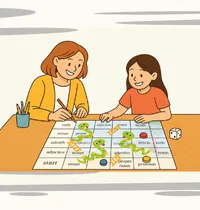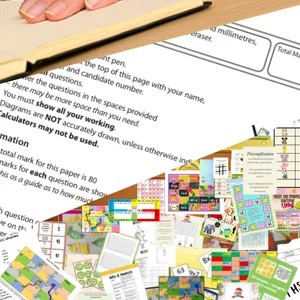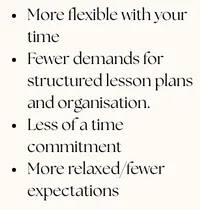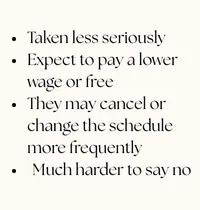
What do people really mean when they ask if tutoring is "easy money"?
To answer that, we first need to define what "easy money" actually is.
Does tutoring involve heavy lifting or long hours working outside in the sun? No. Does it involve life-or-death decisions? Again, no.
But that doesn't mean it's easy.
There's often far more involved than people realise. The idea that anyone can pick it up as a quick way to earn extra income misses the mark.
Like anything else, there are those who put their heart and soul into tutoring, and there are others who do the bare minimum but still expect the biggest reward.
If you'd rather not read the whole article you can watch it here
Is £30 an hour for just chatting fair or misleading?
Early on in my tutoring journey, I had more work than I could handle myself. I began referring other tutors to help families who got in touch. One tutor had mentioned he could help with economics. At the time, my son was doing his A levels and had missed an important economics lesson before a test. I arranged for the tutor to come and cover the missed material.
He charged £50 an hour plus transport. To put that into context, I was charging £20 an hour at the time, which included travel and all the resources. He turned up with just a pen.
He asked Jamie what he wanted to focus on, and Jamie explained. Then he asked what Jamie already knew about the topic, and Jamie said again that he’d missed the lesson and knew nothing, that’s why he’d asked for help. The tutor insisted he must know something. Jamie repeated that he didn’t.
That same back-and-forth went on for the full hour. When the session ended, Jamie had learned nothing, I was financially worse off and completely confused about what had just happened.
I always put my heart and soul into preparing lessons. I show up with carefully chosen resources, tailored to the student’s needs, based on what the family has told me. Yet here was someone charging more than double, who had done nothing to prepare.
When I spoke to him about it later, he simply said, "No one's ever complained before." I wanted to scream, "Well, I am now!" But what would that have achieved? I never recommended him again, and to my knowledge, neither did anyone else I'd originally referred him to.
This might be how some tutors work. But I’d ask, how long can a business like that really last? If there are tutors charging less and delivering more, who do you think gets the recommendations? The testimonials? The next call from a family looking for help?

I’d ask, how long can a tutor that just sits and chats really last? If there are tutors charging less and delivering more, who do you think gets the recommendations? The testimonials? The next call from a family looking for help?
What’s the truth behind the hourly rate?
It all depends. Yes, some tutors turn up with no preparation, and that might work for them in the short term, especially if the family has never worked with a tutor before and doesn’t know what to expect.
But most professional, committed tutors put a lot more effort in behind the scenes.
For example, I always check in to see if there are any specific requests for the next lesson. I plan sessions carefully. These days, I often plan in my head while driving or swimming, that’s when I feel most creative, but when I started, I wrote everything down.
I always prepare more than we’ll likely get through, especially at the start when I’m still learning what the student needs and what resources work best for them.
When I first began tutoring, I took personalisation to the extreme. If a child liked trains and we were doing multiplication, I’d print cards with steam engines on the back of the questions and bullet trains on the answers. It could take me up to four hours to prepare for one lesson.
I’m less precious about things like that now, not every card game needs themed pictures — but if we’re doing creative writing or analogies, I still try to connect them to the child’s personal interests.
So, is tutoring easy money? For some, maybe. But for those of us who care deeply and want to make a real difference, there’s a lot more to it than just turning up.
The Costs and Efforts Involved
This is often relative and will depend on whether your lessons are online or in person. It’s fair to say that most of the cost for online tutoring is in time, while in-person lessons often involve both time and money.
What goes into preparing a session?
Step 1: Decide what the focus of the lesson will be.
Step 2: Think about the types of resources the student responds best to. Some, especially those nearing exams, prefer to work through past papers to build familiarity with the format.
Step 3: Work out which resources you need to create from scratch, which you already have, and whether anything needs adjusting.
Step 4: If the lesson is online, make sure you have sent the Zoom link to the family. Have all the relevant tabs open on your device and double-check there’s nothing visible that might be unprofessional or distracting, such as private information.
Step 5: If it’s an in-person lesson, print out the resources and pack everything into a folder or bag. This includes all the stationery and tools you might need: pens, paper, rulers, calculators, dice, counters for games, and anything else relevant.

What goes into preparing a tutoring lesson?
Travel time, resource creation, emotional energy: what’s not seen?
Even though now that I don’t create a physical lesson plan or personalise every resource for each child, it can still take between 30 minutes to an hour to prepare a single lesson. So that £30 per hour might actually work out closer to £20 once prep time is factored in, and you haven’t even left the house yet.
Then there are the messages from parents. A 10 o’clock message at night asking for a tutor. A Sunday lunchtime ping. A text at 7:30 in the morning.
A couple of years ago, I was visiting my son who was living in Indonesia. A mum messaged to say she was looking for an English tutor for her daughter and that I’d been recommended. I replied to explain I was away and didn’t have my work diary or laptop with me, but I would follow up when I got home. She told me her daughter was in year 11 and preparing for her GCSEs. I acknowledged the message and again said I’d be in touch when I was back in the UK.
She replied again to say they lived in Leicestershire. I explained we were based in Buckinghamshire, so online might be the only option. I repeated that I would be in touch when I got home. Then she started asking about prices and availability.
By that point, steam was coming out of my ears. I had already explained I didn’t have access to my diary, and I was visiting my son. It had been six months since I’d seen him. I felt bad ignoring her next few messages and I didn’t want to appear rude, but time with my own son was more important to me during that time away.
This is the kind of thing people don’t always see. It’s not just about the time you spend delivering lessons. There are constant messages, cancellations, updates about what their child is doing in class, and so on.
You also spend time chasing payments, sometimes in advance, sometimes after the lesson. Most families are fantastic, but a few will stretch your patience and following up takes time and energy.
Is it sustainable income or just “side hustle” material?
That depends on how far you want to take it. If you’re only supporting a couple of relatives or friends, then yes, it could be a side hustle. Or you might decide to work through an agency, where someone else handles many of the day-to-day admin tasks.
But if you decide to build your own tutoring business and rely on it for a sustainable income, be prepared. There will be moments when you want to scream and ask the universe, “Why?”

You might decide to tutor through an agency so that someone else will handle many of the day-to-day admin tasks
The Motivation Behind Tutoring
Why does your why matter when things get tough?
As I have implied in the previous paragraphs there may well be times when you just want to ask “Why!”
It’s a Saturday evening and the family are all meeting up for a family BBQ or sitting down to watch a film and you would love to join them…but you have lessons.
Your son/daughter, niece/nephew is performing in a school production. You would love to go and watch but …you have lessons.
You have a million and one things that need to be done, and the family you are going to see just take you for granted; they have never said thank you, they have never offered you a drink, if you get stuck in traffic and arrive seconds late they expect that time to be added to the end, but they never acknowledge the times that you are early or add time to the end by your own accord. But you’re obliged to go…
This is why you need to own such a strong why. A powerful reason in your mind as to why you will sacrifice other things for tutoring.
Because when it’s cold, dark, and raining and you’re loading up your car with books and resources, or when you're driving home from a session feeling drained and wondering if it even made a difference, that why is what will keep you going.
It’s the quiet voice in your head that reminds you:
“I’m building something.”
“This matters.”
“That child feels more confident because of me.”
Your ‘why’ becomes your anchor. It pulls you forward when motivation fades. It’s what turns what you do from a job into a purpose.
Is tutoring purely transactional or transformational?
Because if you’re only tutoring for the money, there will come a point where it’s not enough. The late nights, the emotional energy, the time away from your family, it will start to feel like a burden.
But when you’re driven by something deeper, a desire to make a difference, to help a child find their confidence again, to give someone the chance they deserve, that’s when tutoring becomes transformational.
Not just for your students. But for you, too.
Every lesson becomes an opportunity. Every small win is a breakthrough. And even on the hard days, you’ll still know it was worth it.
What Kind of Tutoring Are We Talking About?
Casual help for friends? Exam-focused? Neurodiverse one-to-one support?
It may be that having read this far you are now thinking that tutoring is possibly more effort than you had realised it was going to be. It’s not quite the “easy money”, “anyone can do it” “get rich easily” scheme that you had anticipated. So, maybe you will say no to helping your neighbour’s child.
However, before you do there is a huge difference between supporting one or two children in the short term on a casual basis to get them through their exams, to creating a business with the goal of supporting multiple children in the long term.
The pros of supporting just a couple of family friends on a casual basis
If you are working with just one or two families that you also know on a casual basis, you can potentially be more flexible with your time, so you don’t have to cancel your own family events.
It may not have the same demands for structured lesson plans and organisation. You are not trying to build a business or a reputation, you are merely supporting a friend.
It may only take up a couple of hours a week leaving you plenty of time to do the things you want to do rather than always feeling your time is being dictated by tutoring.
Supporting a family member /friend will be more relaxed as they may not put the same expectations on your shoulders.
The cons of supporting just a couple of family friends on a casual basis.
If they see it as you just helping, they may not feel they need to pay you as much, if at all.
They may cancel or want to change the schedule more frequently, which whilst you changing gives you flexibility, them changing makes it harder for you to budget or plan your own time. It’s a double-edged sword.
It’s often much harder to say no to family or friends than it is to an outsider. They will be in your life for a lot longer, and if you don’t support them to the standard or in a way that they expected, the whole family circle will know about it when you are the but of their “jokes”.
How do different types of tutoring demand different levels of energy, skill, and commitment?
There are so many different types of tutoring that it is inevitable that some will demand more energy than others.
A lad I worked with during lock down wanted me to give him an exam question and he would sit and work on that in timed conditions knowing that help was to hand if wanted. It took little energy, little effort.
Having said that, another lad I used to go to was 5 when I first started going. His lessons revolved around playing games, we would have to cheer and wave our arms around when he won, it was all about being high energy and enthusiastic. He was brilliant and I loved working with him, but by the end of the hour I was exhausted. It felt like a high energy workout. Most lessons sit somewhere in the middle, and these days 13 years older, I must admit I prefer the lower energy lessons even if they involve games and enthusiasm.
Both required skill, knowledge and effort, but for each of those lessons and every lesson in between the requirements to tick those boxes would be very, very differently.
The Myths of Tutoring
Myth: “If you can teach, you can tutor.”
Myth: “If you’re smart, tutoring will be easy.”
I am going to question both of those theories.
Several years ago, I had a lady come and work with me. She was lovely and her CV was incredible. For over 34 years she had word as a head teacher and travelled the world teaching English as a second language. She was quite inspirational to talk to.
But…
When it came to working 1:1 she struggled. She was so used to supporting a class of 30 and their generic needs that she found it hard to adapt to working with people as individuals.
After the first lesson I contacted the parents as I always do to find out how they had got on. They responded that she was a lovely lady, but they wouldn’t be continuing.
I then contacted the second family to see how they had got on so that I could contact the tutor and offer my thanks and some feedback. Their response was exactly that of the first family.
Oh…
The third family were on the phone before I had a chance to call them. They were livid. They had been looking for, and I had promised, a tutor who would work with their son as an individual, not as a generic number!
Apparently, she had come in started teaching, knew nothing about him and expected him to follow along and keep up. It had been a nightmare. Obviously, that was the end of her employment with us, she just didn’t fit our model.
I have also found over the past decade that some of the most intelligent people that have enquired about tutoring have also been some of the worst tutors.
They are brilliant and again incredibly inspiring to listen to, but because they see it as common sense, they struggle to break it down into smaller chunks and explain it.
For a lot of families who are looking for tutors, that is what they need. Someone who can break it down and explain it to their child in way that makes sense to them.
It doesn’t matter how long it takes, what is important is that you, as a tutor are speaking their language.

Honest Pros and Cons
What are the fulfilling parts of tutoring
Tutoring is a privilege, and I have met some incredible, inspiring people as a consequence of tutoring. When reports come out, or exam results come out you feel so proud of the difference that you have made. Sometimes it will just be a small win. Or even the other day I had my last lesson of the term with a young girl, she’d just turned 13, and she said: “Thank you for helping with my maths this year”. It seems insignificant, but the fact that it came from a child who hates maths, completely unprompted from a parent, it meant a lot.
I have shared this feedback before, but this is one of the kindest messages I have ever received:
Hi Dawn
I'm so sorry for not replying sooner. I've not been very well and i'm afraid i've not been able to keep up with my emails. I think all the stress of trying to get F through his exams caught up with me as soon as he finished!
I wanted to say a huge ginormous thank you to you for everything you've done for F. You have helped him so much in his maths and english. But for him it's more than that. Before starting with you he was in a really bad place. He felt education wasn't for him and had no hope of passing anything or achieving anything. But by teaching him maths in a way he understood he started to believe that he wasn't totally stupid and maybe he could pass. And then that spiralled as he got better at maths he starting thinking he could maybe do other things and it's really changed his whole outlook. I never thought i'd be sitting here with him discussing A levels let alone him considering going to college after 6th form to studying computing. He is like a different person!
The exam period was not easy but now the stress has gone he's much easier to live with and is enjoying his life of leisure. He wanted me to ask you if there was somewhere he could leave a review for you as he wanted to say thank you and tell other people how good you were for him.
So, a huge thank you from all of us and we will let you know how he gets on.
I hope you have a wonderful summer!
He got a level 8 in his exams and went on to do A’ level maths where he got an A.
What are the tough parts?
However, there are times when you feel like you’re banging your head against a brick wall. The child is using games as an excuse to throw the dice across the room, to doodle on the game: creating their own snakes or ladders, when you sit there for an hour on a boiling hot day and the family give the child a drink, but you are not offered one.
When they are late in paying you, or you log on or turn up and they have forgotten and gone out or now have different plans.
Days like these you just ask yourself why.
Often, I think when it gets to this point, you need to just be strong and tell the family that you don’t think you are the right person to tutor their child, draw a line in the sand and move on, because if you don’t you will start to resent every child that you work with because you will fall out of love with the role.

When you sit there for an hour on a boiling hot day and the family give the child a drink, but you are not offered one.
When does it feel like "easy money" — and when doesn’t it?
It can feel like easy money when you are working with a child who is responsive. Who you get and they respond well to you. When you feel that the family appreciate you and the effort that you put in.
There was one family that I went to for years, and the mum would often come and sit down with us and say: “Dawn, sorry to interrupt, but can I ask you a question?” And she would ask me something about revision, or a certain aspect of maths, or something about supporting her dyslexic son. And because it is something I can chatter about all day, it just felt easy. It didn’t feel like work, it felt like I was there to sit and talk with the parents.
There are families who give you drinks, food, cakes. I used to go to 3 families. The dads of each of the families were brothers. I would get to the first house, and I would be given a drink. When I arrived at the second house I would be given drink and a dessert, the third house would give me a drink, main course and a dessert. It felt like the 3 families were competing to be the most generous. It was fantastic!
But there are also families that you bend over backwards for, and you feel that in their eyes, it’s not enough. The more you give, the more they expect. You feel as if you could give blood and they would still expect more and these are generally also the ones that don’t offer you a drink or are the last to pay. Your efforts are taken for granted, often because they have nothing to compare the service you are providing to any other tutor, so they no doubt think this is what a tutor provides. What you are providing is the expected norm.
Your Self-Assessment before you begin
What questions should you ask yourself before deciding if tutoring is right for you?
Before you decide to become a tutor, I would sit down and ask yourself why.
Why am I doing this, am I doing this for the money, or because I care about helping kids grow?
Do I understand what it takes beyond the lesson itself?
Are you tutoring because you believe it to be easy money. And like I have adhered to, yes it can be. But like everything else, the more you put into it, the more you will get out of it and I’m guessing the fact that you have read this far is an indicator that you are in it for more than just “easy money”.
To be honest, you need a deeper reason why, because tutoring often takes place on an evening and weekend, when everyone else is sat at home relaxing or out socialising and for you, your time will be spent at work.
Are you willing to sacrifice your leisure time?
Have a long think about why you want to become a tutor, is it because you have a passion for the subject and you want to share your knowledge and passion with others?
Is it because you have enjoyed working with your own children and want to take that enjoyment now and make it into a business?
Do you see what’s happening in schools and think that with so many children needing extra support, you want to do something about it.
Your motivation will no doubt change over time, but what is driving you today?
Will that still inspire you on the days when the going gets tough…
Yes, there can be money in tutoring, but the real richness comes from the impact that you can make to someone who has been struggling and now sees the logic, on occasions even enjoys the challenge!
The child who passes the exam and gets into the course they wanted or just never needs to study the subject again. For the child who no longer falls behind all their peers in the weekly test leaving them feeling inadequate.
So, is tutoring easy money?
For some, maybe. But for those of us who care deeply and want to make a real difference, it’s so much more than that. It’s preparation, persistence, and heart. It’s building trust, showing up, and quietly transforming lives, including your own. If you're wondering whether tutoring could be the right step for you, not just for the income but for the impact, you don’t need to have all the answers. You just need to start.
Copywrite: Clara James Tutoring 2025



